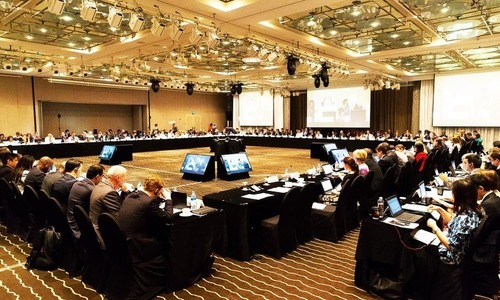ISLAMABAD: While giving a four-month lifeline, the Financial Action Task Force (FATF) has strongly urged Pakistan to swiftly complete its full action plan by February 2020 and until then the country will remain on the ‘grey list’.
The Paris-based FATF reviewed measures taken and progress made by almost 15 countries, including Pakistan, vis-à-vis anti-money laundering and combating financing of terrorism (AML/CFT) in its five-day plenary, which concluded on Friday. Representatives from 206 countries and jurisdictions around the world took part in the meeting. The Pakistani delegation was led by the Minister for Economic Affairs, Hammad Azhar.
At the end of the meeting, three countries — Iceland, Mongolia and Zimbabwe — were added to the grey list, while Sri Lanka, Tunisia and Ethiopia were removed from the list as they have adequately complied with the FATF recommendations.
The news is not that good in the case of Pakistan as the global watchdog warned of action in case significant and sustainable progress is not made across the full range of action plan by the next plenary scheduled for February 2020, a statement issued by the FATF said. The action, it added, could include the FATF calling on its members and urging all jurisdictions to advise their financial institutions to give special attention to business relations and transactions with Pakistan.
Finance ministry reaffirms commitment to implementing watchdog’s action plan
“To date, Pakistan has only largely addressed five of 27 action items, with varying levels of progress made on the rest of the action plan,” the note further said.
While noting recent improvements, the FATF again expressed serious concerns with the overall lack of progress by Pakistan to address its TF (terror financing) risks, including remaining deficiencies in demonstrating a sufficient understanding of Pakistan’s transnational TF risks, and more broadly, the country’s failure to complete its action plan in line with the agreed timelines and in the light of TF risks emanating from the jurisdiction.
The FATF places those countries on its grey list which are not taking measures to combat terror funding and money laundering. Placement on the grey list is a warning for a country that it may be put on the blacklist in case of its failure to take effective measures against money laundering and terror financing.
In 2012, Pakistan was placed on the grey list and remained till 2015. The country was put on the list again on June 29, 2018. Pakistan was given 15 months for implementation of the 27-point action plan, with a warning that in case of failure the country would be added to the blacklist — a list of the countries branded as uncooperative and tax havens for terror funding.
Currently, only Iran and North Korea are on the blacklist.

Since June last year when Pakistan made a high-level political commitment to working with the FATF and APG (Asia Pacific Group) to strengthen its AML/CFT regime and address its strategic counterterrorism financing-related deficiencies, Islamabad has made progress towards improving its AML/CFT regime, including the recent development of its ML/TF risk assessment, according to the FATF statement.
Soon after the FATF announcement, the finance ministry in a statement on Friday reaffirmed Pakistan’s commitment to implementing the FATF action plan.
The FATF meeting considered Pakistan’s progress report on the action plan and its APG mutual evaluation report (MER).
But the finance ministry claimed that the plenary meeting decided to maintain status quo on the FATF action plan and allow the usual 12-month observation period for the APG MER. The Pakistani delegation also held sideline meetings with various delegations and briefed them on the progress made by Pakistan on the FATF action plan and steps taken for strengthening its AML/CFT framework, the finance ministry’s statement said.
At the plenary, Pakistan reiterated its political commitment to completing its action plan and implementing AML/CFT reforms. At the end of five days, the FATF reminded Pakistan that it should make progress on its earlier commitments, the global watchdog’s statement said. Pakistan should continue to work on implementing its action plan to address its strategic deficiencies, including by adequately demonstrating its proper understanding of the TF risks posed by terrorist groups, and conducting supervision on a risk-sensitive basis, it added.
It said Islamabad demonstrated that remedial actions and sanctions were applied in cases of AML/CFT violations, and that these actions had an effect on AML/CFT compliance by financial institutions. Moreover, competent authorities are cooperating and taking action to identify and take enforcement action against illegal money or value transfer services (MVTS).
The authorities will identify cash couriers and enforcing controls on illicit movement of currency; improving inter-agency coordination, including between provincial and federal authorities on combating TF risks; law enforcement agencies (LEAs) are identifying and investigating the widest range of TF activity and that TF investigations and prosecutions target designated persons and entities, and those acting on behalf or at the direction of the designated persons or entities.
It further said that TF prosecutions result in effective, proportionate and dissuasive sanctions and enhancing the capacity and support for prosecutors and the judiciary and demonstrating effective implementation of targeted financial sanctions (supported by a comprehensive legal obligation) against all 1,267 and 1,373 designated terrorists and those acting for or on their behalf, including preventing the raising and moving of funds, identifying and freezing assets (movable and immovable), and prohibiting access to funds and financial services.
The FATF said Pakistan is demonstrating enforcement against TF violations including administrative and criminal penalties and provincial and federal authorities cooperating on enforcement cases; demonstrating that facilities and services owned or controlled by designated persons are deprived of their resources and the usage of the resources.
But the statement said that all deadlines in the action plan have now expired.
Published in Dawn, October 19th, 2019













































